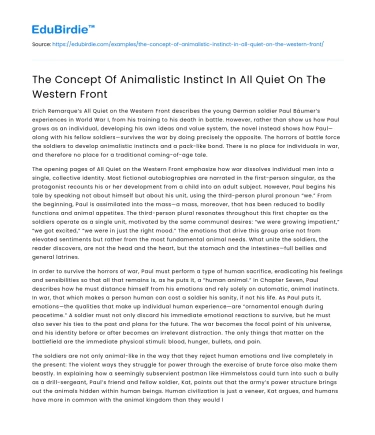Erich Remarque’s All Quiet on the Western Front describes the young German soldier Paul Bäumer’s experiences in World War I, from his training to his death in battle. However, rather than show us how Paul grows as an individual, developing his own ideas and value system, the novel instead shows how Paul—along with his fellow soldiers—survives the war by doing precisely the opposite. The horrors of battle force the soldiers to develop animalistic instincts and a pack-like bond. There is no place for individuals in war, and therefore no place for a traditional coming-of-age tale.
The opening pages of All Quiet on the Western Front emphasize how war dissolves individual men into a single, collective identity. Most fictional autobiographies are narrated in the first-person singular, as the protagonist recounts his or her development from a child into an adult subject. However, Paul begins his tale by speaking not about himself but about his unit, using the third-person plural pronoun “we.” From the beginning, Paul is assimilated into the mass—a mass, moreover, that has been reduced to bodily functions and animal appetites. The third-person plural resonates throughout this first chapter as the soldiers operate as a single unit, motivated by the same communal desires: “we were growing impatient,” “we got excited,” “we were in just the right mood.” The emotions that drive this group arise not from elevated sentiments but rather from the most fundamental animal needs. What unite the soldiers, the reader discovers, are not the head and the heart, but the stomach and the intestines—full bellies and general latrines.
Save your time!
We can take care of your essay
- Proper editing and formatting
- Free revision, title page, and bibliography
- Flexible prices and money-back guarantee
In order to survive the horrors of war, Paul must perform a type of human sacrifice, eradicating his feelings and sensibilities so that all that remains is, as he puts it, a “human animal.” In Chapter Seven, Paul describes how he must distance himself from his emotions and rely solely on automatic, animal instincts. In war, that which makes a person human can cost a soldier his sanity, if not his life. As Paul puts it, emotions—the qualities that make up individual human experience—are “ornamental enough during peacetime.” A soldier must not only discard his immediate emotional reactions to survive, but he must also sever his ties to the past and plans for the future. The war becomes the focal point of his universe, and his identity before or after becomes an irrelevant distraction. The only things that matter on the battlefield are the immediate physical stimuli: blood, hunger, bullets, and pain.
The soldiers are not only animal-like in the way that they reject human emotions and live completely in the present: The violent ways they struggle for power through the exercise of brute force also make them beastly. In explaining how a seemingly subservient postman like Himmelstoss could turn into such a bully as a drill-sergeant, Paul’s friend and fellow soldier, Kat, points out that the army’s power structure brings out the animals hidden within human beings. Human civilization is just a veneer, Kat argues, and humans have more in common with the animal kingdom than they would like to admit. When he participates in viciously swarming the unsuspecting Himmelstoss, Paul himself illustrates Kat’s point by engaging in behavior more appropriate to a savage herd animal than to a rational human individual.
If, as Kat argues, it is the structure of the army that is responsible for bringing out the soldiers’ collective-minded, animal side, then perhaps armistice will enable these men to recapture their individual humanities. Yet for Paul, the prospect of armistice does not seem to promise a return to the human community. Paul imagines that any return to civilized society will be a profoundly alienating experience, one in which “men will not understand” him and in which veterans of his generation will become “superfluous.” His war experience has excluded Paul from the general civilian community, and now the only form of community he can rely on is the animalism of his fellow soldiers. As Paul voices his fear that his generation will fail to “adapt” to the civilized world, his use of Darwinian language draws a final link between the human and animal kingdoms, suggesting that war not only turns the soldier from a human individual into an animal, but that by doing so it ineradicably alters the individual’s ability to relate to other humans.






 Stuck on your essay?
Stuck on your essay?

